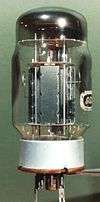KT88
The KT88 is a beam tetrode/kinkless tetrode (hence "KT") vacuum tube for audio amplification.
| KT88 | |
|---|---|
|
KT88 labelled G.E.C. made by GEC/MOV in the U.K. | |
| Classification | Beam-power tetrode |
| Service |
Class-A amplifier, (single-ended) |
| Cathode | |
| Cathode type | Indirectly heated |
| Heater voltage | 6.3 |
| Heater current | 1.6 A |
| Anode | |
| Max dissipation Watts | 42 W |
| Max voltage | 800 |
| Socket connections | |
|
Octal base, (IO) | |
| Typical class-A amplifier operation | |
| Anode voltage | 250 V |
| Anode current | 140 mA |
| Screen voltage | 250 V |
| Bias voltage | -15 V |
| Anode resistance | 12 kilohms |
| Typical class-AB amplifier operation (Values are for two tubes) | |
| Power output | 100 W |
| Anode voltage | 600 V |
| Anode current | 100 mA |
| Screen voltage | 350 V |
| Bias voltage | -45, (class AB2) |
| References | |
|
Super Radiotron Valve Manual, Amalgamated Wireless Valve Co. Australia, June 1962 | |
Features
The KT88 fits a standard eight-pin octal socket and has similar pinout and applications as the 6L6 and EL34. Specifically designed for audio amplification, the KT88 has similar ratings to the American 6550 which was designed for use as a servo amplifier. It is one of the largest tubes in its class and can handle significantly higher plate voltages than similar tubes, up to 800 volts. A KT88 push-pull pair in class AB1 fixed bias is capable of 100 watts of output with 2.5% total harmonic distortion or up to about 50W at low distortion in hi-fi applications. The transmitting tubes TT21 and TT22 have almost identical transfer characteristics to KT88 but a different pinout, and by virtue of their anode being connected to the top cap have a higher plate voltage rating (1.25 kilovolt) and a higher power output capability of 200 watts in class AB1 push–pull.[1]
The screen grid is sometimes tied to the anode so that it becomes effectively a triode with a lower maximum power output.
History
The KT88 was introduced by GEC in 1956 as a larger variant of the KT66. It was manufactured in the U.K. by the MOV (Marconi-Osram Valve) subsidiary of G.E.C, also labelled as IEC/Mullard, and, in the U.S., Genelex Gold Lion.

Current production of the KT88 is limited to Shuguang (China), JJ Electronic (Slovakia) and Russia manufactured by New Sensor Corporation. NOS examples in good condition are extremely rare and quite expensive. Good, current supply of this valve make it popular in contemporary hi-fi production amplifiers.
Historically, it has been far more popular with high fidelity stereo manufacturers than guitar amplifier builders, given its characteristics of high-power and low-distortion. Due to these characteristics, it is regularly used to replace 6550 tubes by end users seeking a guitar amplifier tone with less distortion. Some of the amplifiers which shipped with the KT88 power tube include the Hiwatt Custom 200 and 400 Bass Heads, Sound City L/B 200, 200 watt Marshall Major,[2] Mesa-Boogie Bass Strategy Eight:88 (465 Watt) and Bass Prodigy Four:88 (250 Watt), Orange Thunderverb, Reeves Custom 225 bass, Fryette (formerly VHT) Two/Ninety/Two power amp, Pittbull Ultra-Lead, Sig:X & Deliverance, McIntosh MC2102, Splawn Nitro, Pro Mod, Competition & Superstock, Blackstar Series One 200 and Marshall 2203KK Kerry King Signature JCM800.
See also
References
- ↑ http://www.vintage-technology.info/pages/valves/geckt88.htm Vintage Technology, KT88
- ↑ Fliegler, Ritchie; Jon F. Eiche (1993). Amps!: the other half of rock 'n' roll. Hal Leonard. p. 15. ISBN 978-0-7935-2411-2.
